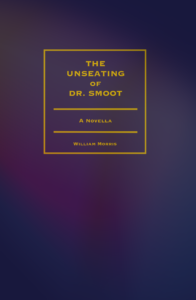 Review
Review
Title: The Unseating of Dr. Smoot
Author: William Morris
Publisher: A Motley Vision
Genre: Novella and short stories
Year Published: 2023
Number of Pages: 124
ISBN-13 : 979-8864377192
Reviewed by David Harris
This edition contains the novella, “The Unseating of Dr. Smoot,” plus two additional short stories. I enjoyed all three works. All contain a wealth of dialogue, both interior and exterior, that brings the characters to life.
The title tale relates the story of Dr. Rebecca Smoot’s short trip to Utah from the Midwest to make a scholarly presentation at UVU and to interview for a position at BYU. This is also an opportunity for her to visit her father and catch up with other family members and friends.
Honestly, the whole idea of interviewing for an academic position makes me downright queasy, but I was happy to experience the process vicariously through Rebecca. As someone who has spent a lot of his life outside Utah (my birthplace was Provo), I enjoyed both the familiar and unfamiliar aspects of Smoot’s brief homecoming. And the conversations with friends and family around church activity and non-activity, an unavoidable aspect of life in 21st century Utah, seem authentic and genuine.
I was intrigued by the author’s idea to spin out the tale in the format of an LDS sacrament meeting with chapters entitled ‘Opening Prayer’, ‘Opening Hymn’, ‘Announcements’, etc. But I have to say that I didn’t find any particularly meaningful connection between the chapter names and the corresponding content of each chapter. Perhaps I just didn’t look hard enough. In any case, that’s a small detail.
“The Ward Organist” was my favorite of the three stories. I think this is because I am a musician and have held Church callings which have involved providing a piano accompaniment and leading the singing.
The mentor in the story, whose strong words of warning against allowing oneself to become “typecast”, for lack of a better word, into the role of organist go unheeded, paints a bleak picture of the monk-like loneliness of the calling. And yet a love of music allows one to overlook this important concern for the sake of music and the sense of accomplishment and satisfaction it brings.
